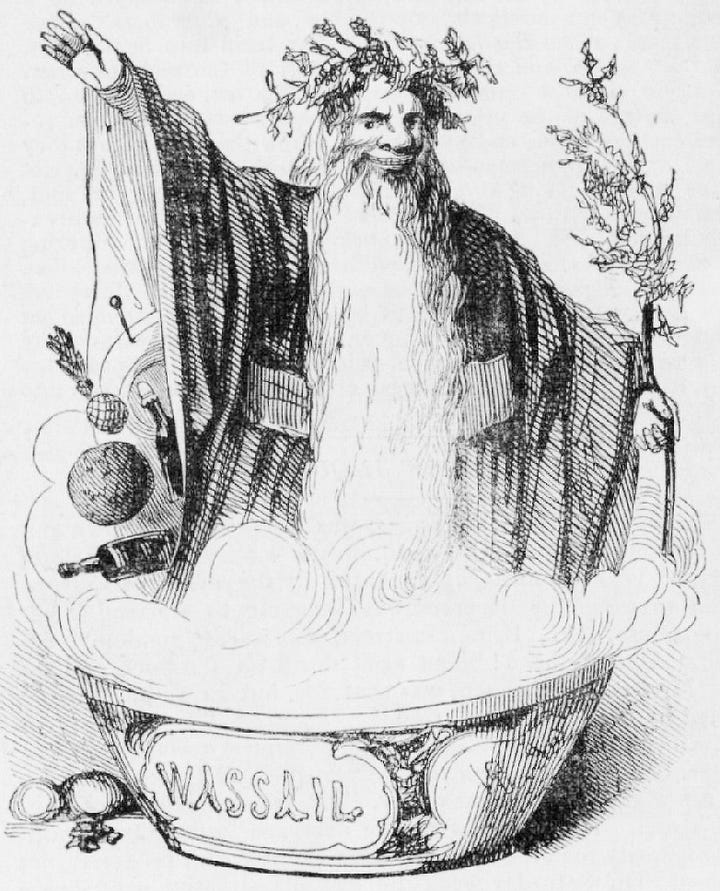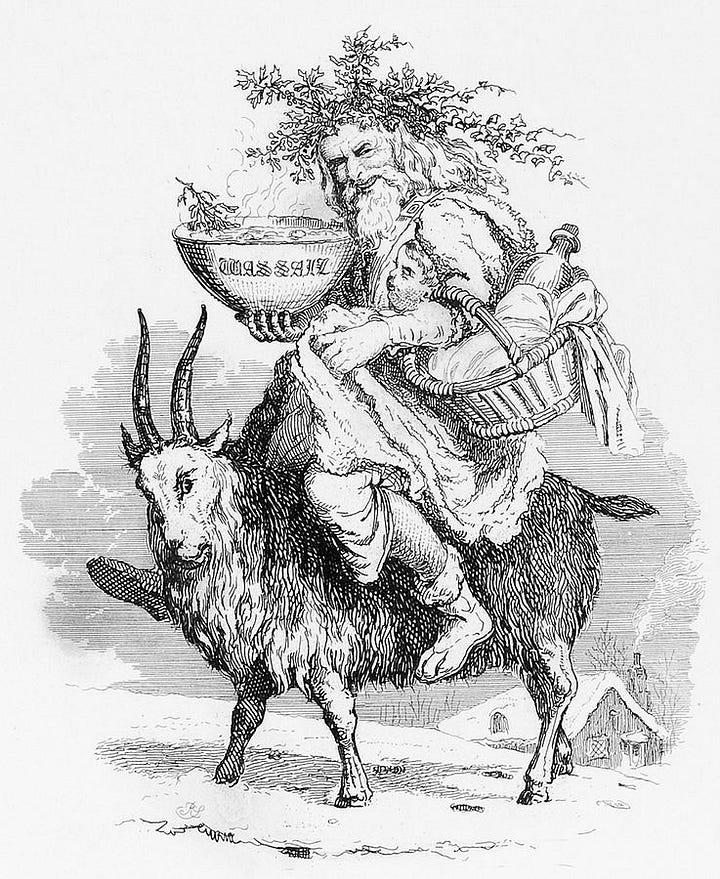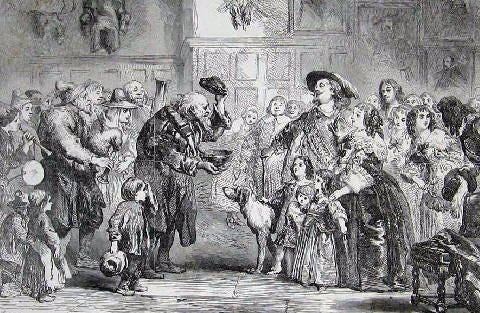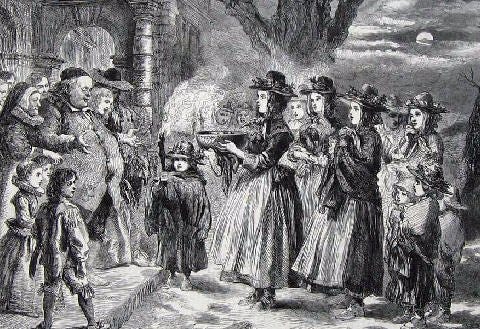Wassailing, Carolling, and the Mari Lwyd
Wassailing the Apple Tree
Wassailing is an ancient tradition whose origins can be traced back to the pre-Christian practice of blessing orchard fruit trees at the winter solstice, Christmas or Yule Eve, or on Twelfth Night. The word wassail comes from the Old English and Anglo-Saxon toast, wes hal or waes hael meaning ‘be of good health,’ which was traditionally met with ‘drink hail’ in reply. Farmers, farm workers and villagers would gather together and in a spirited and merry procession (likely well lubricated with cider), they would visit each orchard with a wooden wassail bowl filled with a warm, spiced alcoholic beverage, commonly apple cider, which was often topped with pureed apple called lamb's wool.


Gathering around the largest and usually the oldest tree in each orchard, the year’s wassail Queen or sometimes the youngest boy called the Tom Tit, placed a piece of wassail-soaked toast in the tree’s branches, a tradition which is probably related to the origin of the term ‘toast.’ The offering of toast was a gift for the birds and animals, and an offering of the wassail, sprinkled around the apple tree roots was a gift to the orchard and the tree spirits, a blessing for its health and a good harvest. It was usually accompanied by traditional wassail songs and much ‘toasting’ from those gathered for the custom. The merrymakers then proceeded to the next orchard, making as much noise as possible with singing, shouting, banging of pots and pans, and even the firing of shotguns. This lively commotion also served the dual purpose of awakening the dormant tree spirits and warding off any malevolent entities lurking among the branches.
Wassail Songs
There are many versions of wassail songs that are specific to certain regions and customs
Here's to thee, old apple tree, Whence thou mayst bud And whence thou mayst blow! And whence thou mayst bear apples enow! Hats full! Caps full! Bushel--bushel--sacks full, And my pockets full too! Huzza! South Hams of Devon, 1871 A-wassail, a-wassail throughout all the town Our cup it is white and our ale it is brown Our wassail is made of the good ale and cake (too) Some nutmeg and ginger, the best you can bake (do) Our wassail is made of the elderberry bough And so my good neighbors we'll drink unto thou Besides all on earth, you have apples in store Pray let us come in for it's cold by the door First stanza of the Gower Wassail Huzza, Huzza, in our good town The bread shall be white, and the liquor be brown So here my old fellow I drink to thee And the very health of each other tree. Well may ye blowm, well may ye bear Blossom and fruit both apple and pear. So that every bough and every twig May bend with a burden both fair and big May ye bear us and yield us fruit such a stors That the bags and chambers and house run o'er. Cornworthy, Devon, 1805
The tradition of wassailing is still popular in England's apple and cider-producing areas, such as Somerset, Devon, and Kent, each with its own particular version of the tradition. An old folktale from Somerset, The Apple Tree Man, tells of a man who, on Christmas Eve, gave his last mug of mulled cider to the trees in his orchard. The Apple Tree Man, the spirit of the oldest apple tree in the orchard, rewarded the man by revealing the location of buried gold, which allowed him to buy the farm and its precious orchard.
The short (3:18 mins) video below is from a BBC local news story about the wassail tradition in the English town of Maplehurst, West Sussex.
The video (11:53 mins) below documents the wassail traditions of two villages in Devon.
The Origins of Carolling
During the Middle Ages, wassailing expanded from rural orchards and country villages, and became a customary practice throughout England. It acted as a form of charitable giving, distinct from begging, in which the peasants would sing traditional songs, perform dances, and engage in merrymaking, and in return feudal lords would display their beneficence by offering the wassailing peasants hospitality, food, drink and sometimes money. Apart from encouraging good will and seasonal festivity, this tradition helped to cement the hierarchical feudal social order.
However:
By the 1500s, wassailing often took the form of bands of drunk peasants, staggering between the houses of richer folk, singing carols and refusing to leave until they have been rewarded for their efforts with a gift or donation of hard cash. The wassailers’ demand for ‘figgy pudding’ in the traditional carol ‘We Wish You a Merry Christmas” is followed up by the menacing “We won’t go until we get some!” Niall Edworthy, The Curious World of Christmas (2008), p.23.


Due to its pagan origins, wassailing faced resistance from the medieval clergy who barred wassailers from churches and it was banned outright in English towns during the Puritan Christmas crackdowns of the 16 and 1700s. Wassailing eventually returned during the Victorian Christmas revival however, the carollers were now usually sobre and often in family or choral groups, singing Christian-themed songs and what we now know as Christmas Carols.
The Mari Lwyd
The Mari Lwyd tradition is a unique and fascinating Welsh custom that takes place during the winter season, particularly around Christmas and New Year. The tradition involves a group of people parading through the streets, carrying the Mari Lwyd, which translates to Grey Mare in English. The Mari Lwyd is constructed from a horse's skull, beautifully decorated with ribbons, colorful cloth, and bells, which is mounted on a pole or stick. The person holding the Mari Lwyd would often conceal their body and face with a white sheet.

The group, led by the Mari Lwyd, would visit houses, singing traditional songs and engaging in witty exchanges of verses with the occupants, known as pwnco, in order to bring good luck and blessings to the visited households. Eventually, the occupants would invite the Mari Lwyd and its group inside, where further merriment and celebrations would take place. Today, the Mari Lwyd tradition is experiencing a revival, with communities and individuals keeping this centuries-old custom alive, ensuring its continuation for generations to come.
The short (6:49) video below beautifully documents the modern revival of the Mari Lwyd tradition.
Stay tuned for the next article where we will start our exploration of the Nordic celebration of Yule, or Jul in time for the start of July.






